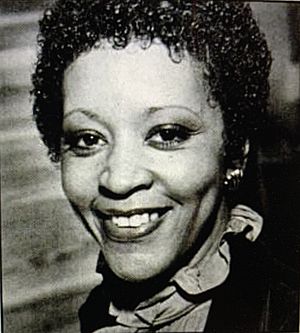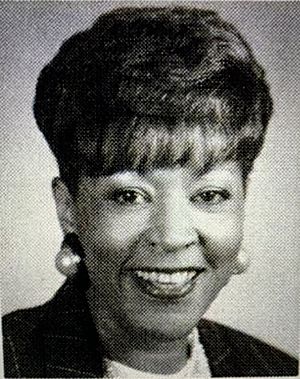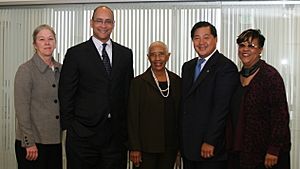Carole Ward Allen facts for kids
Quick facts for kids
Carole Ward Allen
|
|
|---|---|
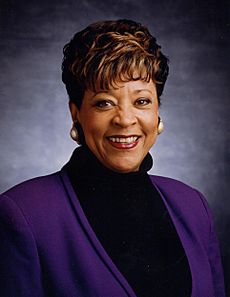 |
|
| Director of the San Francisco Bay Area Rapid Transit from the 4th district | |
| In office December 8, 1998 – December 2, 2010 |
|
| Preceded by | Margaret Pryor |
| Succeeded by | Robert Raburn |
| 51st Oakland Port Commissioner | |
| In office April 20, 1987 – June 5, 1993 |
|
| Preceded by | Christine Scotlan |
| Succeeded by | Ada C. Cole |
| Member of the California Commission on the Status of Women | |
| In office March 14, 1980 – August 20, 1985 |
|
| Governor | Jerry Brown George Deukmejian |
| Personal details | |
| Born |
Carole G. Allen
Phenix City, Alabama, U.S. |
| Nationality | American |
| Political party | Democratic |
| Spouses |
|
| Relatives | Joyce Bryant (cousin) |
| Residences | Atlanta, Georgia, U.S. |
| Education | San Jose State University (B.A.), (M.F.A.) Nova Southeastern University (Ed.D.) |
| Occupation | Professor, Politician |
Carole Ward Allen is an American politician, a teacher, and a political advisor. She is part of the Democratic Party and leads her own company, CWA Partners, LLC. As a leader in mass transportation in California, Ward Allen was an elected member of the San Francisco Bay Area Rapid Transit District Board of Directors. She served three four-year terms, representing the 4th district from 1998 to 2010.
In the 1980s and early 1990s, she was often featured in Jet Magazine for making history in state and local politics. Before working in transportation, Ward Allen was chosen to be on the California Commission on the Status of Women. This appointment was made by California's 34th Governor Jerry Brown in 1980. In 1983, her colleagues elected her to be the commission's first African American chairperson for one year. Ward Allen served on this state commission until 1985.
In 1987, Oakland's 45th Mayor Lionel J. Wilson appointed Ward Allen to the Oakland Board of Port Commissioners. In 1990, she was elected by the board members to serve as their president. This made her the first African American woman and the longest-serving woman to achieve this role, serving two one-year terms. After six years in public office at the Port of Oakland, her time there ended in 1993.
In 1998, voters elected Ward Allen to the BART board of directors. As a BART director for the 4th district (which includes Oakland, California and Alameda, California), she helped get $4 billion for system repairs. She also supported the transit oriented development of the Fruitvale Village and programs to make the system stronger against earthquakes.
On December 15, 2005, the BART board of directors elected Ward Allen as its president and Lynette Sweet as its vice president. This made BART the first major transportation agency in American history to be led by two African American women.
In 2010, she guided the BART Board and the San Francisco Bay Area region in approving the $484 million Oakland Airport Connector project. She also helped secure money for it from President Barack Obama's administration.
Contents
Early Life and Education
Carole G. Allen was born in Phenix City, Alabama. Her mother was Nell G. Allen, and her father was Claude O. Allen. Her father was a World War II veteran and a lawyer who focused on criminal law. He was one of the first African American lawyers in Oakland, California. He was also the first African American to run for the Alameda County Board of Supervisors.
After finishing Castlemont High School in 1960, Ward Allen went to college. She earned a Bachelor of Arts and a Master of Fine Arts from San Jose State University. She also received a Doctor of Education in Higher Education from Nova Southeastern University in Fort Lauderdale, Florida.
Additionally, Ward Allen studied at other universities around the world. These included the Sorbonne in Paris, Fourah Bay College University in Sierra Leone, the University of Ile-Ife in Nigeria, the University of Kumasi in Ghana, and the University of Nairobi in Kenya.
Teaching Career at Peralta Community College District
In 1970, Ward Allen started her career at Peralta Community College District. She worked as a professor of Fine Arts at Laney College in Oakland, California. Later, she became the assistant vice chancellor for urban development for the entire Peralta Community College District. Before that, she was the director of community relations and marketing at Laney College.
Ward Allen retired from Peralta in 2005. However, she continued to teach as an adjunct professor until 2017. She taught students African American history and was part of the ethnic studies department.
California Commission on the Status of Women
Working for Women's Rights
On March 14, 1980, Governor Jerry Brown appointed Ward Allen to the California Commission on the Status of Women. In 1983, she became its first African American chairperson. Her time with the state commission ended in 1985, during the leadership of Governor George Deukmejian.
Much of her work involved helping women in small businesses and large companies. She also worked to improve the lives of military wives. A big part of her efforts was fighting for women to be able to return to their jobs after pregnancy. As the commission chair, Ward Allen pushed for fair workplace policies. These policies led to women receiving paid maternity leave. She worked closely on this with then-Assemblywoman Maxine Waters, who introduced a bill about it in 1984. Ward Allen also supported women getting equal pay for equal work.
She told The New York Times that women should be allowed to return to work after having children and receive maternity leave under California law. She believed maternity leave was a very important right for women. She felt that not having a maternity leave law in California forced women to make a false choice, saying:
"In essence it says women have a choice: You can choose to work or you can have children. But you can't have both."
California state legislators Diane Watson and Waters worked closely with Commissioner Ward Allen on issues related to women's rights in society. Ward Allen served on the commission with Hannah-Beth Jackson, who later became a California state senator. She also worked with Irene Inouye, who would become the chair of the Ford Foundation Board of Trustees.
Oakland Board of Port Commissioners
Time as Commissioner
In 1987, Oakland's 45th Mayor Lionel J. Wilson nominated Ward Allen. The Oakland City Council then appointed her to serve on the Oakland Board of Port Commissioners. From 1990 to 1992, she served as commission president. This made her the first African American female to lead the port in its history. At that time, Oakland's port was one of the top ten ports in the country. She was also the second African American woman and the third female to be appointed to the commission.
During her six years with the port, Ward Allen was in charge of transportation, business, financial, and political plans. These plans were for developing the port's shipping facilities, the Oakland International Airport, and its commercial real estate. As a port commissioner, she approved port rules, gave directions to the chief executive officer, and approved money for economic development projects. She also managed a budget of $100 million, which supported over 44,000 jobs directly and indirectly.
Ward Allen led many port planning, development, and productivity projects. She worked with port authorities around the world. While she was president of the board of port commissioners, she expanded shipping and aviation activities.
On August 6, 1991, she hired Charles Roberts as the port's chief executive officer. She also approved a controversial board decision to give the City of Oakland $5.2 million. This helped the city deal with its money problems in 1991 and balance its budget.
Bringing Amtrak to Oakland
Ward Allen and her board members worked to get funds to bring Oakland - Jack London Square (Amtrak station) to Oakland in the early 1990s. This happened after the 1989 Loma Prieta earthquake. This was the second time in history that Amtrak came to Oakland. The Amtrak station officially reopened in 1995 and is owned by the Port of Oakland. Ward Allen was involved in much of the legal work and contracts for the Port of Oakland owning the facility where the Amtrak station was built. She led the Port from 1990 to 1992, working with two different city mayors: Lionel J. Wilson and Elihu Harris.
Jack London Square Re-development
Ward Allen was a key supporter of the Jack London Square Re-Development project in the late 1980s and early 1990s. In 1989, when Ward Allen was vice president of the Port of Oakland Board of Commissioners, the Port's main office moved to Jack London Square. Her name was engraved on the building.
Dredging Projects
In July 1991, then-President Ward Allen of the Board of Port Commissioners pushed for permits to allow dredging at the port. Dredging means removing mud and sand from the bottom of a harbor to make it deeper. She argued for dredging along with labor representatives and other agencies, saying:
"Dredging is already needed . . . the port is the shallowest on the West Coast."
Oakland Aviation High School
Ward Allen supported the creation of Oakland Aviation High School. The Oakland Unified School District adopted this charter school, with the Port of Oakland as a partner. Even when she was on the BART Board, she continued to support this school, a commitment she started during her time on the Board of Port Commissioners.
BART Board of Directors
Time as Director
Voters first elected Ward Allen to serve on the BART Board of Directors on November 3, 1998. BART is a special group that manages the Bay Area Rapid Transit system in Alameda, Contra Costa, and San Francisco counties in California. Ward Allen represented the 4th district in Alameda County, which included the cities of Oakland and Alameda. She was re-elected in 2002 and 2006 without anyone running against her.
During her time on the board, Ward Allen changed policies, procedures, and operations. She also reformed the BART Police with help from the California State Legislature and the public.
She also supported hiring Dorothy Dugger as the first woman to be the general manager or CEO of the entire BART organization. Although Ward Allen originally wanted to hire an African American woman, Beverly Scott, she had to compromise.
Ward Allen always pushed for transit oriented development policies. This led to affordable housing and good communities for people in the Fruitvale, Coliseum, and Lake Merritt areas. She helped businesses owned by minorities and women stay strong and created job opportunities for people in her district.
Her biggest achievements were passing legislation to build the Oakland Airport Connector project and supporting civilian oversight of the BART Police Department. She asked the California State Legislature for help, according to the San Francisco Chronicle, saying:
"We urge our state legislators to take swift action so we can implement civilian oversight this year."
She also served as vice president in 2005 and President in 2006 of the BART board of directors. She managed a budget of $672 million for the transportation agency.
Oakland Airport Connector Project
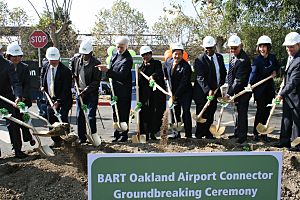
Since 1998, Ward Allen worked hard to create contract opportunities for small businesses owned by minorities and women. Her main goal in elected office was to provide employment opportunities for people in Oakland and Alameda. She often worked with local unions to create jobs and help people financially, especially after the Great Recession. For example, the Oakland Airport Connector project created about 2,500 to 5,200 direct and indirect jobs. Ward Allen actively supported many of BART's important actions. These included its first Project Labor Agreement that prioritized jobs for disadvantaged communities in her district. She also created the first small business and bonding committee to help reduce economic differences for minority-owned businesses.
On October 20, 2010, BART director Ward Allen held a groundbreaking event for the project at the Oakland Coliseum Station. She was joined by Congresswoman Barbara Lee, Mayor Ron Dellums, Assemblywoman Sandre Swanson, Oakland city councilman Larry Reid, Port of Oakland officials, local union representatives, and ministers. The high-tech and environmentally friendly 3.2-mile automated Oakland Airport Connector began operating in November 2014.
Ensuring Fair Access (Title VI)
As chairwoman of the Oakland Airport Connector Committee, she asked for input from many different communities. This included people who did not speak English and those with low incomes. This happened after a civil rights complaint about the Oakland Airport Connector's construction. She was the first BART director to demand that signs and documents be in multiple languages. This was to help her communities and make sure diverse groups understood how to leave train stations in an emergency. This was especially important for Oakland's Chinatown and Fruitvale districts, which have many Asian and Latino residents. Also, she made sure there were live translators available for the first time in BART's history during community meetings in 2009.
California Law for Civilian Oversight
On July 15, 2010, Governor Arnold Schwarzenegger signed the important BART Accountability Act AB 1586 into California law. Ward Allen had urged the California State Legislature to pass this law during a Senate hearing on June 15, 2010. She worked closely with Assemblyman Sandre Swanson, who wrote the law, to make sure there was civilian oversight of the BART Police Department. Ward Allen thanked the governor, the community, the entire BART organization, and Assemblyman Swanson for their hard work on getting AB 1586 passed after the shooting of Oscar Grant. The law also created the Office of the Independent Auditor at BART. This office would investigate issues brought to the BART Board by the civilian oversight committee.
Besides changing California law, Ward Allen supported Oscar Grant's family. She was the only BART director on the nine-member board who attended the Oscar Grant trial in Los Angeles during the summer of 2010. Earlier that year, she was a main speaker at the first vigil honoring Oscar Grant and supporting his family at the Fruitvale station. In her speech, she apologized again on behalf of BART for his tragic death. She also gave Grant's uncle, Cephus Johnson, a bouquet of flowers for the family. The events leading to Grant's death were shown in the film Fruitvale Station, where Michael B. Jordan played Grant. The Fruitvale station was in Ward Allen's district.
BART Police Department Changes
In 2009, two independent groups were hired to review BART's policies and procedures. This was part of reforming the BART Police. These two groups, the National Organization of Black Law Enforcement and Myers Nave, investigated the issues around the BART Police Shooting of Oscar Grant. They were asked to give recommendations to the board. Ward Allen agreed that the BART Police Department needed to be reformed and reorganized. She told the public at the first board meeting after the shooting:
"We must learn from our mistakes and we must make sure [the killing of unarmed passenger] never happens again. I want to hear everything you have to say. You have every right to hold us accountable."
After this, Ward Allen created and led BART's first Police Department Review Committee. As a result, BART made big changes to many security measures. They also fixed and put in place several new policies and procedures. The BART Police Department Review Committee led to all officers being re-trained on use of force, diversity, and other topics. Ward Allen hired Kenton Rainey to lead BART's 296-member police force as Chief of Police.
Coliseum Intercity Rail Station
On May 25, 2005, then-Vice President Ward Allen of the BART board of directors joined Oakland Mayor Jerry Brown, city councilman Larry Reid, CCJPA vice chair Forrest Williams, and Caltrans Division of Rail Chief Bill Bronte. They were at the grand opening of the Oakland Coliseum Intercity Rail Station. She supported building the $6.6 million facility to offer other ways for people in Oakland and the Bay Area to use public transportation. Ward Allen served on the Capitol Corridor Joint Powers Authority board of directors for several years in the early 2000s.
Fruitvale and Coliseum Transit Villages
Ward Allen worked to create a more eco-friendly and green environment for BART. This led to the largest BART bicycle station being built as part of the Fruitvale transit village. The Fruitvale transit village is a national example for transit oriented development, thanks to the leadership of Ward Allen and former BART director Margaret Pryor. The Fruitvale transit village was built with the Spanish Speaking Unity Council. Phase I was finished in 2004. This phase included 94 rental units, with 92 of them being affordable homes for low-income families, and 2 market-rate units. This was a big success for BART's 4th district residents in the City of Oakland. On July 22, 2010, Ward Allen and the BART Board approved 3.4 acres of undeveloped property for Phase II of the transit village.
She also worked hard on the Coliseum transit village for over ten years. She approved the building of single-family homes for sale there. Some of these homes were set aside for low- and moderate-income residents, along with shops and restaurants. Ward Allen worked closely with Oakland city councilman Larry Reid to approve the third stage of the transit village project. This stage would explore building about 100 affordable housing units on what is now a 1.3-acre parking lot at Snell Street and 71st Avenue in their shared district.
Helping Small, Minority, and Women-Owned Businesses
In 2009, Ward Allen created BART's first Small/Minority/Women-Owned Business and Bonding Committee. This committee aimed to solve big problems that stopped minority- and women-owned construction businesses from getting information quickly. It also worked to make plan rooms available to low-income communities, speed up responses for money, and help businesses qualify for contracts. Ward Allen argued that the BART Board should set aside part of its capital budget to support disadvantaged businesses. This resulted in BART putting up to $45 million into the local economy between 2009 and 2014, with much of that money going to businesses owned by minorities and women.
Public Service Awards
In March 2011, Ward Allen was honored and inducted into the Alameda County Women's Hall of Fame in the category of Education. According to The Oakland Post, she has taught over 100,000 students in the San Francisco Bay Area. Many students have said that she made a big difference in their lives and inspired them to learn.
The Conference of Minority Transportation Officials (COMTO) gave Ward Allen the Lifetime Achievement Award at its annual ceremony in 2011. This was for her dedication to public service in the transportation industry. They also recognized her for starting the Oakland Airport Connector, an important construction project she helped make happen.
In 2008, Laney College President Frank Chong recognized Ward Allen for her leadership in higher education with the President's Award.
In 2005, she received an award for her expertise as a pioneering executive in public transportation. The National Coalition of 100 Black Women, Inc San Francisco Bay Area chapter gave her the Pioneer Award at their 7th Annual Madam C.J. Walker Business and Community Recognition Awards Luncheon. At that time, Ward Allen was the Vice President of the BART Board of Directors.
See Also
- African American firsts
- Bay Area Rapid Transit
- Port of Oakland
- Shooting of Oscar Grant
 | DeHart Hubbard |
 | Wilma Rudolph |
 | Jesse Owens |
 | Jackie Joyner-Kersee |
 | Major Taylor |


